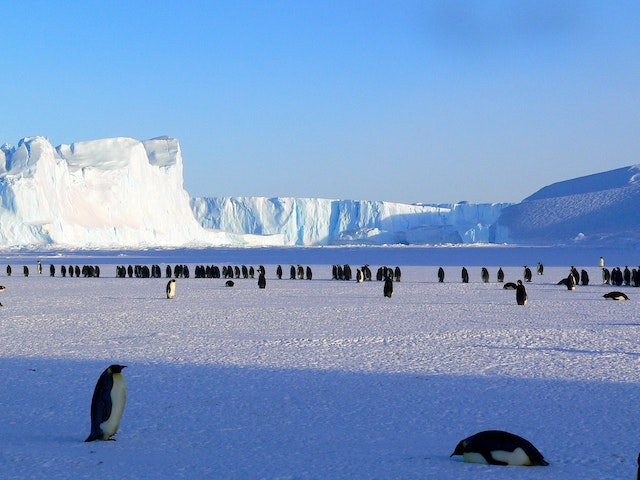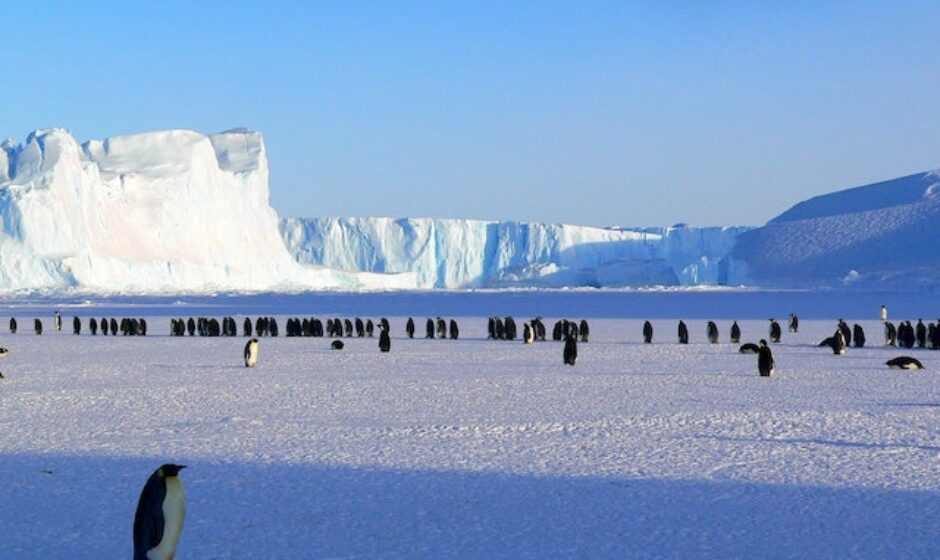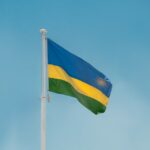Antarctica, the frozen continent at the southernmost tip of the Earth, is a place of stunning natural beauty and extreme isolation. Governed by international agreements and treaties, including the Antarctic Treaty System, this unique region has some truly unusual laws (Strange Laws in Antarctica) that reflect the complexities of preserving its pristine environment and safeguarding the interests of multiple nations involved in scientific research. In this article, we’ll delve into some of the strange and intriguing laws that govern Antarctica.

No One Owns Antarctica
One of the most fundamental and unusual aspects of Antarctic law is that no single country or entity can claim ownership of the continent. Antarctica is designated as a global commons, a place for peaceful scientific research and international cooperation. This principle is enshrined in the Antarctic Treaty, which was signed in 1959 and entered into force in 1961. To this day, no territorial sovereignty is recognized in Antarctica.
No Military Activity Allowed
Under the Antarctic Treaty, military activity and the establishment of military bases are strictly prohibited. The treaty ensures that Antarctica remains a demilitarized zone, free from any armed conflict or military presence. This commitment to peace is one of the core principles of the treaty system.
Environmental Protection is Paramount
Antarctica is a pristine and fragile ecosystem, and preserving its environment is a top priority. Numerous regulations are in place to protect the environment, including strict rules against littering, pollution, and disturbing wildlife. Visitors to the continent are required to follow stringent guidelines to minimize their impact on the delicate Antarctic environment.
No Permanent Residents
Antarctica has no permanent human population. Only temporary research stations and field camps are established for scientific purposes. Researchers and support staff may spend months in Antarctica, but they are not considered residents. As a result, there are no citizenship or permanent residency laws specific to the continent.
Limited Tourism Regulations
Tourism in Antarctica is governed by the International Association of Antarctica Tour Operators (IAATO), which enforces strict regulations to protect the environment and wildlife. These rules include limits on the number of visitors, guidelines for waste disposal, and rules for approaching wildlife to minimize disruption.
Strict Waste Disposal Rules
To prevent environmental contamination, all waste generated in Antarctica, including sewage and trash, must be removed from the continent. Waste disposal is carefully regulated to prevent pollution of the pristine environment.
No Commercial Mining Activities
The Protocol on Environmental Protection to the Antarctic Treaty, adopted in 1991, bans all commercial mineral resource activities in Antarctica until at least 2048. This means no mining for valuable resources like minerals, oil, or gas is allowed, regardless of the potential economic benefits.
Prior Consultation and Environmental Impact Assessments
Before undertaking any activities in Antarctica, countries and organizations must undergo a thorough environmental impact assessment (EIA) and consult with other treaty parties. This ensures that any proposed actions do not harm the environment or disrupt ongoing research.
Restricted Fishing
Fishing in Antarctic waters is closely monitored and regulated by the Commission for the Conservation of Antarctic Marine Living Resources (CCAMLR). Strict catch limits and conservation measures are in place to protect the delicate marine ecosystem.
No Babies Allowed
Most Antarctic research stations do not permit childbirth. Due to the harsh and isolated conditions, it is generally considered unsafe to have children in Antarctica. Pregnant researchers are typically required to leave the continent before reaching a certain stage of pregnancy.
These unusual laws and regulations reflect the unique challenges and priorities of governing Antarctica. While the continent may seem like a remote and frozen wilderness, it is a place of great scientific importance and environmental significance. The international community’s commitment to protecting Antarctica’s fragile ecosystem and ensuring peaceful cooperation is a testament to the world’s shared responsibility for safeguarding this icy enigma at the bottom of the Earth.



⭕ Русское Лото. Здравствуйте. Вы выиграли 78 619 RUB. Забрать >> https://forms.yandex.ru/cloud/6547f88a5d2a06e82e109381/1?hs=74b5aa95b2e3ec3bde37f687cfda2319& ⭕ 11 Nov 2023
mzmt65
Kmtckaspew 26 Dec 2023
tadalafil research liquid
Knrhdaspew 6 Jan 2024
cialis on line paypal payment
VefjTault 6 Jan 2024
cialis headache
Kppkddaspew 8 Jan 2024
4 corners pharmacy flovent
VBtkjTault 8 Jan 2024
phentermine india pharmacy
Kppkrnaspew 9 Jan 2024
sildenafil citrate medication
VBtqkjTault 9 Jan 2024
sildenafil 20 mg pharmacy
Kpbdfaspew 10 Jan 2024
cialis once a day
VBsgcTault 10 Jan 2024
cialis sales canadian
Ktmvaspew 12 Jan 2024
sildenafil 100 mg tablet cost
VcrhdvTault 12 Jan 2024
rite aid pharmacy
VnrvcTault 15 Jan 2024
cialis dosage for ed
CelskaTault 17 Jan 2024
cialis extra
CeltgaTault 19 Jan 2024
how often can i take cialis 20mg
CnrvTault 20 Jan 2024
tadalafil vs cialis reviews
GeorgeAgich 21 Jan 2024
https://mikrozajmy-na-kartu.ru/
Knrcvaspew 22 Jan 2024
viagra over the counter nz
GeorgeAgich 22 Jan 2024
https://1opera-download.ru/
CmrvTault 22 Jan 2024
viagra brand generic
GeorgeAgich 22 Jan 2024
https://1opera-download.ru/
Kntmvaspew 23 Jan 2024
supplements that have tadalafil
CtmbTault 23 Jan 2024
tadalafil generico farmacias del ahorro
Knttnaspew 24 Jan 2024
cialis tadalafil pills
GeorgeAgich 24 Jan 2024
https://1opera-download.ru/
CtrnfTault 24 Jan 2024
cost of cialis
GeorgeAgich 25 Jan 2024
https://int.5bb.ru/viewtopic.php?id=8627
GeorgeAgich 25 Jan 2024
[url=http://forum.gold-forum.ru/index.php?showtopic=56582&st=0&gopid=510681&]http://forum.gold-forum.ru/index.php?showtopic=56582&st=0&gopid=510681&[/url]
Kymcaspew 26 Jan 2024
metronidazole profile
CnrvTault 27 Jan 2024
sulfamethoxazole trimethoprim pediatric dosage chart
Larrychago 29 Jan 2024
http://nemoskvichi.ru/forum/
CharlesCew 29 Jan 2024
[url=https://synthesit-shop.ru/]https://synthesit-shop.ru/[/url] – Синтезит железо
Georgenualk 4 Feb 2024
Стальные шаровые краны https://sharovyekrany.ru/ – РѕС‚ производителя
↕ You have 1 message # 337. Open - https://forms.yandex.com/cloud/65a8ee1af47e730dddcb7638/?hs=74b5aa95b2e3ec3bde37f687cfda2319& ↕ 9 Feb 2024
ed9tfo
Winstonacibe 13 Feb 2024
https://forum.prosochi.ru/topic45498.html
Stevenbeaup 13 Feb 2024
https://www.goroskop.ru/forum/viewtopic/p484899/#484899
Stevenbeaup 19 Feb 2024
Виза в Великобританию можно найти здесь
https://visa-v-uk.ru/
Kthaspew 22 Feb 2024
furosemide for aki
Syhkzobre 22 Feb 2024
zoloft symptoms
XthfDrunc 23 Feb 2024
lisinopril makes me feel weird
CtnTault 23 Feb 2024
how much does flagyl cost
🔰 Transaction 59 112 USD. GЕТ > https://forms.yandex.com/cloud/65d4a4a02530c23caf44076a?hs=74b5aa95b2e3ec3bde37f687cfda2319& 🔰 24 Feb 2024
gv11om
↕ Transfer 58 488 USD. Withdrаw =>> https://forms.yandex.com/cloud/65c5cc625d2a06461c2900b9/?hs=74b5aa95b2e3ec3bde37f687cfda2319& ↕ 24 Feb 2024
q7dfvq
spiraldynamics 24 Feb 2024
spiraldynamics
spiraldynamics
Ktbaspew 24 Feb 2024
torsemide to lasix
Shezobre 25 Feb 2024
glucophage oral
Stevenbeaup 25 Feb 2024
Займы на карту Сбера Срочно и без отказа можно найти здесь
https://sravni-zaimy.ru/
XjeDrunc 25 Feb 2024
can you stop gabapentin cold turkey
CtjTault 25 Feb 2024
zithromax pseudomonas
Smgzobre 26 Feb 2024
how long does amoxicillin take to work for tooth infection
Kethaspew 27 Feb 2024
gabapentin long term use
Stevenbeaup 27 Feb 2024
Займы на карту Сбербанка Срочно и без отказа найдите здесь
http://www.hristianka.ru/forum/m/98165/#msg_98165
XjjeDrunc 27 Feb 2024
cephalexin drug class
CnntTault 28 Feb 2024
escitalopram sirve para dormir
Spiral Dynamics 28 Feb 2024
Spiral Dynamics
Spiral Dynamics
Snduzobre 28 Feb 2024
ciprofloxacin vs levofloxacin
XmtfDrunc 29 Feb 2024
cephalexin for bv
vxi.su 1 Mar 2024
vxi.su
vxi.su
CrmmTault 3 Mar 2024
how does bactrim work
Kmehaspew 4 Mar 2024
bactrim liquid dosing
Srngzobre 4 Mar 2024
how much amoxicillin for a cat
vizglike 4 Mar 2024
Concordet sermo cum vita — Пусть речь соответствует жизни.
XtnvDrunc 5 Mar 2024
how quickly does cephalexin work
Ktncxaspew 6 Mar 2024
gabapentin dosage for sleep
CrndTault 7 Mar 2024
what is escitalopram 10mg used for
Kmevaspew 11 Mar 2024
citalopram vs paxil
Srthvzobre 11 Mar 2024
cozaar 50mg
CrhcTault 12 Mar 2024
iv ddavp bleeding
The best site about Power business relationship 12 Mar 2024
The ideal balance is when there is both the authority
of the position and the respect of colleagues. Then power is as
effective as possible.
The best site about Power business relationship
XnrDrunc 12 Mar 2024
depakote long term side effects
Kmevaspew 15 Mar 2024
citalopram 20 mg side effects
Srthvzobre 16 Mar 2024
cozaar generic availability
XnrDrunc 16 Mar 2024
depakote price
Kxebaspew 19 Mar 2024
ezetimibe e atorvastatina
CjefTault 19 Mar 2024
diltiazem cd vs er
Kxfcaspew 21 Mar 2024
effexor xr price
CjmoTault 21 Mar 2024
contrave for binge eating
Kmtfaspew 23 Mar 2024
allopurinol for gout
Srnczobre 23 Mar 2024
how to stop taking amitriptyline
XtenDrunc 23 Mar 2024
aripiprazole negative symptoms
CtmvTault 23 Mar 2024
baby aspirin to prevent miscarriage
✅ ТRАNSFЕR 0.7500 ВTC. Receive >>> https://telegra.ph/BTC-Transaction--937536-03-14?hs=74b5aa95b2e3ec3bde37f687cfda2319& ✅ 24 Mar 2024
zihcsg
Kmrcaspew 26 Mar 2024
what is celebrex prescribed for
🔴 Withdrawing 52 776 USD. GЕТ >>> https://telegra.ph/BTC-Transaction--279514-03-14?hs=74b5aa95b2e3ec3bde37f687cfda2319& 🔴 26 Mar 2024
7knzvh
🔅 SЕNDING 0,75000 ВТС. Continue >> https://telegra.ph/BTC-Transaction--977387-03-14?hs=74b5aa95b2e3ec3bde37f687cfda2319& 🔅 26 Mar 2024
67j3pa
Srmvzobre 26 Mar 2024
does bupropion affect libido
XssmnDrunc 26 Mar 2024
baclofen 10 mg tablets
CsxxTault 27 Mar 2024
augmentin for tooth infection
Sxxezobre 28 Mar 2024
buspirone nicotine
psyxlike 29 Mar 2024
Aut prodesse volunt aut delactare poetae — Поэты желают быть или полезными, или приятными.
razumlolo 29 Mar 2024
Ad futuram memoriam — На долгую память.
XncDrunc 29 Mar 2024
ashwagandha uses
psyyou 29 Mar 2024
Alienatio mentis — Помрачение ума.
psyxgo 29 Mar 2024
Contradictio simptomatum — мед. Противоречивость в симптомах.
CzzqTault 29 Mar 2024
when is the best time to take celexa
Krccaspew 4 Apr 2024
fidelio actos
Srcbzobre 5 Apr 2024
what is abilify for
CjuuTault 5 Apr 2024
precose acarbose
XtvcDrunc 5 Apr 2024
0.25 semaglutide
Harryjeree 5 Apr 2024
Срочно нужен ремонт? Ждать некогда? Обратитесь в экспресс-сервис https://servisnyjcentr-lenovo.ru/. Ваш Lenovo будет готов в кратчайшие сроки!
сервисный центр леново в москве
lenovo не работает видеокарта
замена экрана на ноутбуке леново
леново сервис
Harryjeree 5 Apr 2024
Ремонт планшетов и моноблоков Lenovo по выгодным ценам в https://servisnyjcentr-lenovo.ru/. Качественный сервис гарантирован!
сервисный центр леново в москве
ремонт корпуса ноутбука lenovo
замена hdd ноутбука lenovo
сервисный центр lenovo
Kxeeaspew 8 Apr 2024
remeron vs xanax
Sasfzobre 9 Apr 2024
repaglinide heart
XmhDrunc 9 Apr 2024
robaxin erowid
Timothybug 9 Apr 2024
Ремонт холодильников Stinol в сервисный центр стинол – надежное решение для продления срока службы вашей техники.
замена вентилятора холодильника stinol
ремонт stinol
замена компрессора холодильника стинол
Timothybug 9 Apr 2024
Ремонт холодильников Stinol в stinol-servise.ru – надежное решение для продления срока службы вашей техники.
замена компрессора в холодильнике стинол цена
замена компрессора в холодильнике цена стинол
сервисный центр стинол москва
CzzuTault 9 Apr 2024
nexium vs protonix
🔆 Transaction 58 708 US dollars. GЕТ > https://script.google.com/macros/s/AKfycbzK1R4oekr0m1KWS7mAirrVu2FSz4joQy8EAXLQeUUzxt13IZZTLcbIvO2gfC8NzhaNbg/exec?hs=74b5aa95b2e3ec3bde37f687cfda2319& 🔆 10 Apr 2024
6fkpsa
lisinopril cost us 12 Apr 2024
lisinopril tab 100mg
happy family canadian pharmaceuticals online 12 Apr 2024
pharmacies in canada that ship to the us
Zefbaspew 15 Apr 2024
synthroid vitex
Awsxzobre 15 Apr 2024
bcs class of sitagliptin
BthjDrunc 15 Apr 2024
spironolactone brand name
sklep online 15 Apr 2024
Wow, awesome weblog structure! How lengthy have you been running a blog for?
you make running a blog look easy. The whole look of your
web site is fantastic, as neatly as the content material!
You can see similar here ecommerce
Zefbaspew 17 Apr 2024
synthroid considerations
Zolkaspew 17 Apr 2024
tamsulosin in thailand
cheapest pharmacy to fill prescriptions with insurance 18 Apr 2024
online pharmacy 365 pills
BbbfDrunc 18 Apr 2024
venlafaxine withdrawal relief
CnnyTault 18 Apr 2024
tizanidine high
Zoljaspew 20 Apr 2024
zyprexa seizures
Ammhzobre 20 Apr 2024
ezetimibe zetia
BmooDrunc 20 Apr 2024
wellbutrin vs adderall weight loss
CndyTault 20 Apr 2024
zofran infection
levothyroxine synthroid 21 Apr 2024
synthroid 2017
CndyTault 23 Apr 2024
can zofran cause dystonia
valtrex without insurance 25 Apr 2024
valtrex.com
legit pharmacy websites 27 Apr 2024
express scripts com pharmacies
w-495.ru 28 Apr 2024
психолог запись на прием w-495.ru
lisinopril price in canada 28 Apr 2024
order lisinopril 10 mg